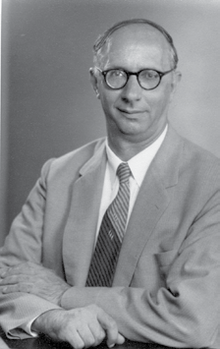Mir Basri
Mir (also transliterated as Me'īr and Meer) S. Baṣrī (Arabic: مير بصري; 1911-2006) was an Iraqi Jewish writer, economist, journalist, and poet.[1] Among many public positions he held, Basri served as the head and central leader of Baghdad's Jewish community.[2]
Mīr Baṣrī | |
|---|---|
 | |
| Native name | مير بصري |
| Born | September 19, 1911 Baghdad, Iraq |
| Died | January 4, 2006 (aged 94) London, UK |
| Language | Hebrew, Arabic |
| Nationality | Iraq |
Life
Basri was born on September 19, 1911 in Baghdad, Iraq to Shaool Basri and Farha Dangoor.[3] Basri was educated Baghdad at al-Ta'awun and the Alliance school where he studied Hebrew, English, and French. Following his secondary education, he trained as an economist and studied Arabic literature.[1][4] In 1928, Basri joined the Iraqi Foreign Ministry, going on to hold a number of government positions including many relating to Iraq's Jewish community.
In early January 1969, Basri, then-Chairman of the Jewish Council of Iraq, was detained for almost two months for interviewing an American who the Iraqi government alleged to be a spy. His detention has been characterized as motivated by antisemitic efforts to censor the Iraqi Jewish community. In the early 70's Basri, who had originally been unwilling to immigrate from his home country, left Iraq for Amsterdam. From Amsterdam, he immigrated to the UK where he lived until his death in 2006.[5]
Writing
During his career, Basri wrote in a variety of genres, including poetry, biography, periodical, and essay and memoir.[6][1] Much of his writing is centered on his identity as a Jew living in the Arab world during the establishment of Israel; themes of patriotism, homeland, Zionism, and religion are common.[7]
Basri described himself as being enthralled with Arabic, particularly Arabic poetry, and published much of his work in the language.[8]
References
- 1947-, Meisami, Julie Scott, 1937- Starkey, Paul (1998). Encyclopedia of Arabic literature. Routledge. OCLC 39109208.CS1 maint: numeric names: authors list (link)
- "The Day Iraqi Jews Return to Baghdad". Haaretz. 2002-07-26. Retrieved 2019-01-15.
- The Middle East and North Africa. Volume 22. Europa Publications. 1975.
- Simon, Reeva (2003). The Jews of the Middle East and North Africa in Modern Times, Volume 2. Columbia University Press. ISBN 9780231107969.
- Snir, Reuven (2006). "Arabic Literature by Iraqi Jews in the Twentieth Century: The Case of Ishaq Bar-Moshe (1927–2003)". Middle Eastern Studies. 41 (1): 7–29. doi:10.1080/0026320042000322699. ISSN 0026-3206.
- Snir, Reuven (2006). "Arabic in the Service of Regeneration of Jews". Acta Orientalia Academiae Scientiarum Hungaricae. 59 (3): 283–323. doi:10.1556/aorient.59.2006.3.2. ISSN 0001-6446.
- Snir, Reuven (1991). "We Were Like Those Who Dream": Iraqi-Jewish Writers in Israel in the 1950s". Prooftexts. 11 (2): 153–173. JSTOR 20689305.
- Bashkin, Orit (2012). New Babylonians : A History of Jews in Modern Iraq. Stanford University Press. ISBN 9780804782012. OCLC 893925553.
- Mir Basri, by Shmuel Moreh, Encyclopedia of Jews in the Islamic World, 2010, p 3 - 5